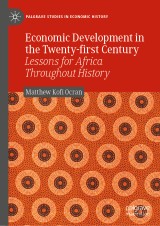Details

Economic Development in the Twenty-first Century
Lessons for Africa Throughout HistoryPalgrave Studies in Economic History
|
106,99 € |
|
| Verlag: | Palgrave Macmillan |
| Format: | |
| Veröffentl.: | 27.04.2019 |
| ISBN/EAN: | 9783030107703 |
| Sprache: | englisch |
Dieses eBook enthält ein Wasserzeichen.
Beschreibungen
<div><p>This book uses lessons from history to help African countries take charge of their own economic development agenda. History is an important part of Africa’s economic development narrative, and Ocran investigates how the development outcomes between Africa and Western Europe became so divergent when in the early medieval period average income levels and economic development in the two regions differed only marginally. The sixteenth century marked a turning point, with the emergence of Western European mercantilism and capitalism and their associated exploitation of other countries. In understanding Africa’s economic development, it is crucial to recognise that Africa has not always been poor.</p>Examining 400 years of enslavement and colonisation, this book takes us to present day Africa and economic issues affecting the continent. With selected case studies from Hong Kong, Taiwan, and Singapore to South Korea and China, Ocran proposes ways to break out of the economic development quandary Africa currently faces.<p></p></div>
<div><p></p><p>Part I: General Background and Governing Issues.- Chapter 1: Why history is important in Africa’s economic development narrative.- Chapter 2: Economic development: Facts, theories and evidence.- Chapter 3: Case studies of development approaches.- Part II: European Growth and Development that Shaped Africa.- Chapter 4: Medieval European economies.- Chapter 5: Mercantilism as a world economic order.- Part III: African Experience in the Long Run.- Chapter 6: Medieval African economies.- Chapter 7: Emaciation of African economies I: The Atlantic slave trade, 1451 – 1830.- Chapter 8: Emaciation of African economies II: Colonisation, 1885 – 1957.- Chapter 9: Post-independent African economies: 1960 – 2014.- Chapter 10: Lessons for economic development for Sub Saharan Africa.</p><br><p></p></div>
<div><b>Matthew Kofi Ocran</b> is Professor of Economics and Deputy Dean of Academic Affairs at the Faculty of Economics and Management Sciences, University of the Western Cape, South Africa. His current research interests lie in macroeconomics, development economics, development finance and economic history. <br></div><div><br></div>
<p></p><p>This book uses lessons from history to help African countries take charge of their own economic development agenda. History is an important part of Africa’s economic development narrative, and Ocran investigates how the development outcomes between Africa and Western Europe became so divergent when in the early medieval period average income levels and economic development in the two regions differed only marginally. The sixteenth century marked a turning point, with the emergence of Western European mercantilism and capitalism and their associated exploitation of other countries. In understanding Africa’s economic development, it is crucial to recognise that Africa has not always been poor.</p><p>Examining 400 years of enslavement and colonisation, this book takes us to present day Africa and economic issues affecting the continent. With selected case studies from Hong Kong, Taiwan, and Singapore to South Korea and China, Ocran proposes ways to break out of the economicdevelopment quandary Africa currently faces.</p><p> </p><p><b>Matthew Kofi Ocran</b> is Professor of Economics and Deputy Dean of Academic Affairs at the Faculty of Economics and Management Sciences, University of the Western Cape, South Africa. His current research interests lie in macroeconomics, development economics, development finance and economic history. </p><br><p></p>
Compares economic development in Africa and Western Europe throughout medieval and modern history Looks at colonisation as an instrument of wealth creation and economic development in Western European countries Demonstrates the importance of research and development and innovation and technological development as key drivers Suggests how countries like South Africa can break out of the low economic growth trap

















